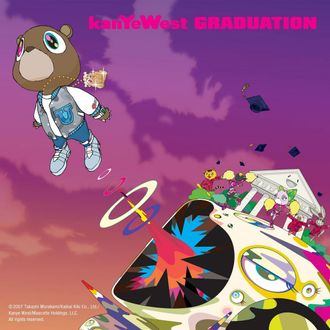
Graduation, which turns ten today, probably isn’t the worst Kanye West LP, but even if it were, that would hardly be cause for shame. In keeping with its title, Kanye’s third album puts on a weird costume and participates in a ceremonious procession, but behind the ordered facade something disheveled invariably peeps through. Graduation marks the first work from the artist that isn’t entirely cohesive. The flow between songs is interrupted by variances in production: Instead of the unified, mural-like soundscape of The College Dropout and Late Registration, the impression left by Graduation is more of a collage. Its flaws are intrinsic, not incidental. After two albums (really, one masterpiece done twice over) drawing on rich samples from his native heritage of black gospel, soul, and R&B, Kanye seemed determined to change things, to introduce a higher level of chance and error into his creation. He was prepared to venture into any territory, so long as it wasn’t familiar. As a result, listeners were subjected to an anomalous Chris Martin hook, the incredibly dull repetitions of “Drunk and Hot Girls,” and an album closer (“Big Brother”) where Kanye, after a couple reverent verses dedicated to Graduation executive producer, Roc-A-Fella label head and big-brother figure Jay-Z, passive-aggressively complained about Jay-Z stealing his idea of a Coldplay feature for himself. He then walks it back a bit by adding, “Should have talked you like a man, should have told you first,” but the fact that he was discussing this publicly at all was a harbinger that the Ye-Z partnership would be unstable at best.
No one works with Coldplay unless they’re interested in making pop music, and Graduation is the first Kanye album to take the artifices of pop stardom for its material. On College Dropout and Late Registration he had kept himself to wry commentary from a collective source. Now he was no longer a student among other students, but a lone graduate facing an uncertain future with a confused vision. Kanye’s brand is and will always be uplift: be it spiritual, financial, social, or cultural, the man seems not to believe in his own existence unless he’s rising. But how far up could one go after touching the sky? Graduation is inferior to its predecessors in the same way that being a champion is less gratifying than the process of competing itself. Kanye was alone and a star, but he didn’t much sound like he enjoyed it. No one could tell him anything, but he wasn’t sure what he had left to say.
It’s remarkable, given the disorientation described and embodied on Graduation, how marvelous the album sounds regardless. One-third of the album is disposable, but the remaining tracks stand out all the brighter against their dimness. Takashi Murakami’s album art announced that Kanye had set out to craft a star-making LP by seeking alien spaces, and its successes feel momentous as landing on another planet: be it Daft Punk’s electronica, T-Pain’s Auto-Tune, or Young Jeezy’s ad-libs, Kanye expanded his celestial empire to include them all. Many innovations that would take precedence in West’s later career first entered circulation on Graduation. The individualism, synths, and slowness predate 808s; though 808s broke new ground, particularly with its dirge-like usage of Auto-Tune, much of the ground it broke was originally located on its predecessor. A superior predecessor, arguably: More unified than Graduation, Kanye’s glacially mournful fourth album lacks the collective firepower of “Champion,” “Stronger,” “Good Life,” “Can’t Tell Me Nothing,” and “Flashing Lights.” (In any case, framing Graduation and 808s as lesser Kanye albums, though true, can obscure the equally valid fact that even lesser Kanye albums are superior to the best albums of most other artists.)
Graduation isn’t the best album, but it may well have the best lines Kanye ever committed to wax:
Feeling like Katrina with no FEMA;
Like Martin with no Gina;
Like a flight with no visa;
First class with the seat back, I still see you
In my past — you on the other side of the glass
Of my memory’s museum…
I’m just saying, hey Mona Lisa, come home,
You know you can’t roam without Caesar.
–“Flashing Lights”
Kanye’s always been an artist of collective memory, someone consciously and deeply in tune with the cultural tradition his creations advance. The octet from “Flashing Lights” achieves, under the sign of bereftness, a flawless union of the personal and historical, the aesthetic and political, inherited wealth and dispossessed soul. You could fit Drake’s entire aesthetic into its space and still have room to spare.
Along with countless others inspired by Ye’s album and its successors, Drake would prevail in the pop marketplace to such an extent that the landscape of contemporary pop, tinged with electronica and shot through with rap (even Taylor Swift is rapping now), is effectively a building that Kanye, with Graduation as the blueprint, originally designed. For all the falls and rises in Kanye’s reputation since 2007, his commitment to a mainstream sound deep enough to convey his own personal truth and broad enough to incorporate everything in time and space has remained firm. The past is the key to the future, whether it’s personal drama with Jay-Z, a disastrous Gulf hurricane, a Republican president who doesn’t care about black people, or incredibly catchy Atlanta-rap ad-libs, Graduation makes clear that time spirals back as much as it advances in a straight line. Though Kanye is now older and a father, with his fast-cash fantasies and sartorial inclinations he resembles no one so much as his own father as remembered on “Champion”: “Every summer he’d get some / Brand-new harebrained scheme to get rich from / And I don’t know what he did for dough, / But he’d send me back to school with a new wardrobe.” No matter what decade it is, Kanye’s never finished with reshaping the past or creating the future. The old Mr. West is the new Mr. West, and Graduation is the proof.

